 MyDogBreeds
MyDogBreedsOld English Terrier is originated from United Kingdom but Gull Terr is originated from Pakistan. Old English Terrier may grow 21 cm / 8 inches shorter than Gull Terr. Old English Terrier may weigh 30 kg / 66 pounds lesser than Gull Terr. Both Old English Terrier and Gull Terr has almost same life span. Both Old English Terrier and Gull Terr has same litter size. Old English Terrier requires Moderate maintenance. But Gull Terr requires Low maintenance
Known also as the Black Terrier, by the 18th century, the Old English Terrier was available as a rough-coated dog as well as a smooth-coated dog.
The dogs were established in England. The dog was developed to work and by the 19th century the Old English Terrier was to be found all over the world.
The dog was developed based on the work it was required to do, leading to variations in the coat texture, the body and size. The Old English Terrier is recognized today by the National Terriers Club LLC.
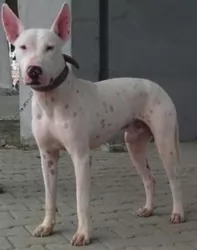 The Gull Terr hails from Pakistan. Having been introduced to the country by the British Raj, the dog has always been valued for its guarding and fighting abilities.
The Gull Terr hails from Pakistan. Having been introduced to the country by the British Raj, the dog has always been valued for its guarding and fighting abilities.
The British army, on bringing English Bull Terriers with them, mated them with local dogs. The dog was in other words, created from the old bull terrier which became extinct, and the Bully Kutta.
The Gull Terr or Pakistani Bull Terrier as he is known is a rare breed of dog. Today they are usually found in rural areas of Pakistan as well as in the Indian Panjab area, becoming popular as both pet and watchdog. It is no longer used for dog fighting as this has been banned.
The Old English Terrier is a working dog, a sporting terrier known for his athleticism. This is a vibrant dog, both physically and mentally, and the dog will require plenty of physical exercise as well as mental stimulation.
If you go to a reputable pet shop, you will find many stimulating toys for such a clever dog. He is also social and friendly and makes a wonderful pet.
Your Old English Terrier stands at between 30 – 45cm and weighs between 6 and 15kg. The face of the dog is wedge-shaped and the eyes are set wide apart. The ears are erect and the tail has been docked but is left long these days.
The coat of the dog can be either rough or smooth and it is available in solid black or white or a black and tan mix.
The Old English Terrier is a working and sporting terrier. He makes a wonderful companion pet. He is an intelligent, boisterous type of dog and early training and socialization are necessary to make him obedient and more amicable around people and pets.
They are loving with their human family, but because they require such vigorous exercise, they are better suited to life in the countryside as opposed to living in a cramped space in the city.
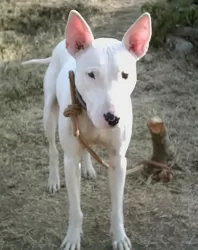 As a medium sized dog, the muscled Gull Terr stands as 45 – 66cm in height and weighs in the area of 40 – 45kg.
As a medium sized dog, the muscled Gull Terr stands as 45 – 66cm in height and weighs in the area of 40 – 45kg.
The dog has a short, smooth coat which is white, but you may find some black spots on him. He has a egg shaped head, ears are naturally erect, dark slanted eyes, and he has a long tail which is held upwards. Muscled and agile, he is a powerful working breed and makes a good watchdog.
This is an aggressive dog breed, and first-time dog owners might want to have a more amicable kind of pet to start off with.
He is a fearless dog, somewhat aggressive and suspicious towards strangers and therefore wants to protect his owner from them. With training and socialization he can be good with children in the home, although he is inclined to be boisterous and stubborn. He has fierce protective instincts, even though he is considered not as aggressive as some other Pakistani dog breeds.
The Gull Terr will need an experienced dog handler. Even though he has been a fighter in his day, he is capable of being an excellent family pet as well. You won't have trouble training him as he is intelligent. He then becomes more obedient and more manageable. He is a very active dog and therefore he won't fit into city dwelling where there are small spaces. He needs a place to run and on top of that he will require a good deal of exercise.
Your Old English Terrier is a working dog and while he is known to be independent and sometimes quite stubborn, he is intelligent and trainable.
He should be trained and socialized and then he becomes a great family pet, being amicable with children and other pets. He is a good natured pet but he has lots of energy and will rely on you to provide him with walks and games, whether you live in the city or the countryside.
Give him the right upbringing and you can be assured of the most splendid pet and companion.
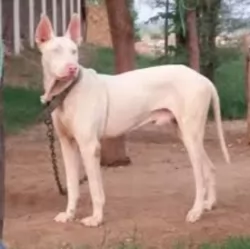 Your Gull Terr love the attention he receives from his human family and he won’t flourish at all if he is put into the back yard for watch dog purposes only. He is a dog that needs to come indoors to be with his family.
Your Gull Terr love the attention he receives from his human family and he won’t flourish at all if he is put into the back yard for watch dog purposes only. He is a dog that needs to come indoors to be with his family.
He tends to be somewhat aggressive and this is why he isn’t looked upon as the ideal pet for first-time dog owners and those with young children in the home.
He is a confrontational dog, willing to enter into a fight with provocation. Strong willed he will require early training and socialization, and when he is brought up by a firm, consistent, kind owner, he can get over his aggression and become a loyal, devoted, protective and loving pet.
There are some health problems with a dog that can be inherited, but some illnesses develop because of bad lifestyle and bad diet along with lack of exercise.
Your Old English Terrier can live to anything from 10 to 14 years of age, but there are always some common dog diseases that you may want to be aware of.
Dental disease, skin allergies, hip dysplasia, cancer, epilepsy, bloat and eye diseases are just some of the diseases that are highly unlikely, but which can be worrisome for your pet.
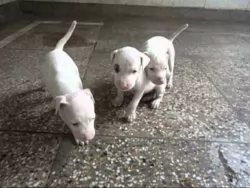 The Gull Terr has a deep chest and this means he is more prone to bloat, a condition known as gastric dilation volvulus.
The Gull Terr has a deep chest and this means he is more prone to bloat, a condition known as gastric dilation volvulus.
Your pet's stomach fills with air and this leads to decreased blood flow to vital organs. The stomach can twist and this is when the condition becomes life threatening as blood supply to the stomach is cut off. Instead of feeding him large meals, feed him smaller meals more frequently.
Deafness in your pet can be temporary or permanent, in one ear or both. There are are so many reasons why your pet could be deaf and it could be a birth defect, an infection or old age. Certain dogs such as the white coated Gull Terr are also more predisposed to congenital deafness.
Get him to the vet who will examine your dog’s ear canal for wax and debris and discuss the way to go for your beloved pet.
Looking after your Old English Terrier is easy, whether you choose the short- or long haired breed, requiring you to brush him twice a week to remove those loose hairs. Check in and outside the ears for ticks and fleas and check around the eyes for infections.
Always run your hands over your dog to make sure there are no unusual lumps which could be indicative of cancer.
Make sure your pet has a nice dry, warm place to sleep, and if he is outdoors, make sure he has a spot to lie down in that is out of the sun and rain.
He is an active dog and will require a walk each day as well as ball- and rope games.
Every dog will benefit from a high quality diet, both commercially manufactured food and home-made food. Dogs want their meals to be simple, tasty, consistent and delicious.
Dry kibble needs to be of a high quality and you can add in simple home-made food to his kibble and which is simple – boiled chicken, brown rice or pasta and vegetables such as spinach, sweet potatoes and carrots. When you can afford it, some raw meat added into the kibble will be a welcome treat.
Such a simple diet will ensure you don’t battle with your dog’s digestion and it will keep him bright-eyed and healthy. Ensure a constant supply of fresh, cool water.
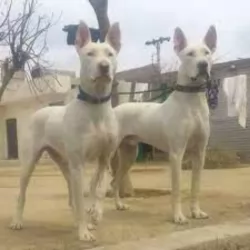 Easy to look after with his short coat, the Gull Terr will only require a brushing twice a week to keep the coat shiny and healthy.
Easy to look after with his short coat, the Gull Terr will only require a brushing twice a week to keep the coat shiny and healthy.
Because his coat is white, it can show dirt easily, and it will simply require taking a damp cloth and wiping the mark off him. You don't want to be bathing him often as this dries his skin out – rather just wipe the coat down.
Your Gull Terr is a highly energetic dog and he loves nothing more than to be involved in robust exercise and games. He is best suited in a home with large grounds and if you do opt to have him in the city, you will have to pay close attention to his exercise needs – lots of walks, runs, ball games, swimming and running with you as you cycle.
You want to be sure that your energetic Gull Terr has a healthy diet full of important proteins, fats, and carbohydrates.
Protein is always important for a dog like this and you want to make absolutely sure that apart from his high quality kibble, you mix in raw meat from time to time as well as cooked chicken, fish, brown rice and vegetables.
When looking for a commercially manufactured dog food, look for high-quality animal protein as a top ingredient. Make sure he always has fresh, cool water available to him.